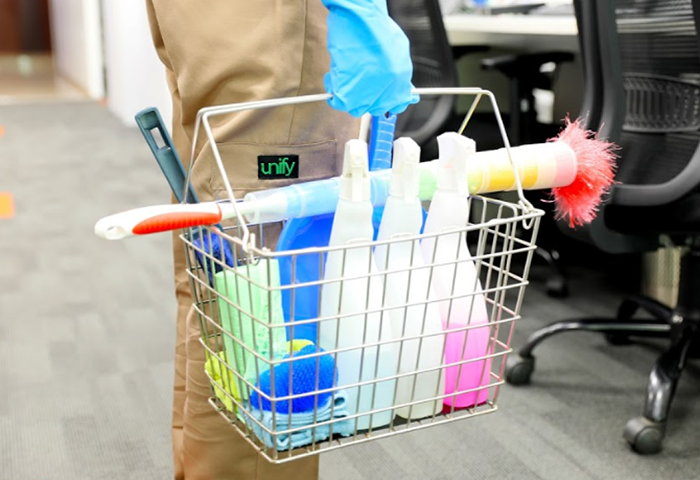How Housekeeping in Retail Stores will Change Post COVID-19

Tags: housekeeping services
Community locations like retail stores are enclosed places and thus are prone to becoming breeding grounds for viruses like the COVID-19 virus. Even after the virus is eliminated, probable dangers will still linger, which is why necessary precautions should be taken.
Retail stores need to pay attention to aspects like the store's products, retail and housekeeping staff, and incoming customers to prevent any infection from spreading inside the store. Retail stores will be required to reel in proper safety measures with proper sanitation regularly, so the store does not transform into a hotspot for the virus. Housekeeping services will play an integral role in safety maintenance.
Along with introducing proper safety protocols and developing robust SOPs, it is advised that retail stores run on some strict guidelines. In order to give you an insight on how you can prevent the virus from spreading inside the store, here’s a step-by-step guide on what you can do.
1. Time Slot Allotment to Customers
Just like malls, retail stores will be one of the most visited places post lockdown and due to the shortage of resources, the high traffic will be unstoppable, but the incoming customer flow should be limited to just a few people during a certain period of time. This will ensure social distancing by limiting the clutter inside the stores.
Social distancing in retail stores can be effectively practiced by allotting different time slots for different customers. Select a few retail store staff and assign them the duty to distribute store-authorized time-tokens to customers. For instance, 20 customers will be allotted a 12:00 pm time slot, whereas the other 20 will be allotted a 01:00 pm time slot and so on, assuming 1 hour for the existing shoppers.
This strategy might be exhausting for you as well as your customers, but such precautionary measures are the need of the hour. This way, your store and your customers will continue to be safe.
2. Entrance Checkpoints Upgradation
Now that your customer has arrived at the allotted time, having general security checks at the entry gates will not entirely secure your retail facility. Firstly, the retail store should upgrade their security checking measures to a contactless one.
Ensuring that the incoming customers are entirely devoid of any sickness is essential. The retail stores’ security officers must be given PPE safety kit like gloves and masks since they will be exposed the most to the diverse range of customer traffic. Thereafter, the customers should be encouraged to download the mandatory Arogya Setu app on their phones. Only after ensuring that their phone’s Bluetooth is turned on and they haven’t tested positive on the app, the customer should be permitted inside the store.
Apart from that, infrared thermometers should be used at the checkpoints to check if the person isn’t exhibiting any symptoms of sickness. In case a customer does show symptoms, they must be politely deterred from entering the facility.
Retail stores can also install an automatic sanitizer dispensing unit to let the customers enter the stores after sanitizing their hands and getting rid of outside germs. Such an intense security checkpoint strategy can be relatively tedious but will help you in the long run in maintaining safety inside your retail store.
3. Additional In-store Safety Measures
After the customers pass the security checkpoint, your store is still not entirely safe. Customers must be mandated to equip themselves with PPE like masks and gloves even inside the store. In fact, everyone from the customers to your staff must be encouraged to equip themselves with PPE. This will lower the risk of the spread of germs or probable virus.
If the customer still wishes to take off their gloves and insists on touching products they don’t intend to buy, they must be stopped immediately from doing so. If they persistently request to check the product before dropping into the basket, customers must first be asked to sanitize their hands before touching anything inside the store.
Your housekeeping services staff must be briefed about the decided SOP of your retail store before you set your guidelines in motion. This will help them to monitor the in-store movements of your customers and prevent any infringement of your safety protocols.
4. Payment Process Digitization
Now that your customers arrive at the billing desk after finding all the necessary products they needed to buy, encourage them to use virtual/digital payment methods. Ask your customers to download virtual/digital payment apps on their smartphones and request them to avoid cash or card transactions for the next few months. Digital transactions are the safest compared to cash transactions or debit/credit card transactions since they lower direct contact.
However, if customers are unable to operate smartphones due to some reasons, and digital/virtual payment is a barrier, cash payment should be availed for only such limited customers. However, while receiving such cash payments, the cashier at the billing desk must be equipped with gloves. The customer should also be encouraged to do so.
Lastly, if the customer has touched any store asset, the housekeeping staff should sterilize those surfaces. Any infringement of the laid out protocols must be discouraged with strict actions.
The cooperation between your retail staff and housekeeping services in the coming months will play an integral role in maintaining and uplifting your store’s safety protocol. Especially, your housekeeping staff, who can direct customers with safety rules and keep your retail facility risk-free and germ-free. Such professionalism can only be exhibited by housekeeping staff who have undergone rigorous training to follow safety procedures. Considering that Unify’s housekeeping services meet the desired standards, you should reach out to us if and when you need assistance in housekeeping or any other facility management services.
